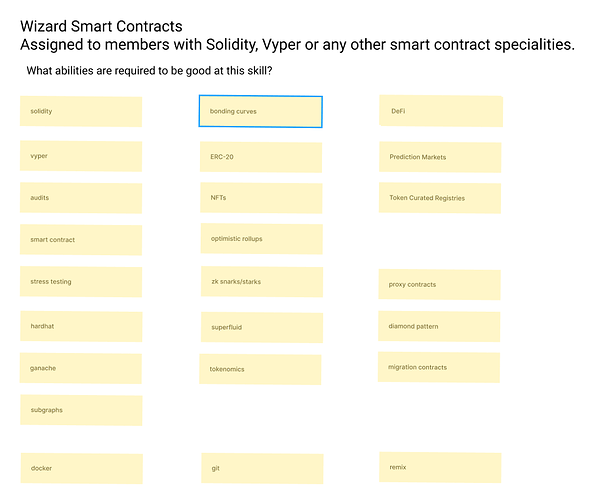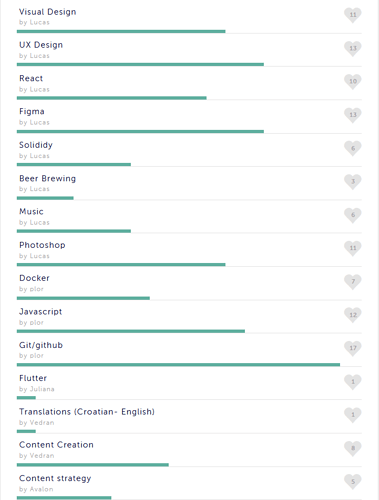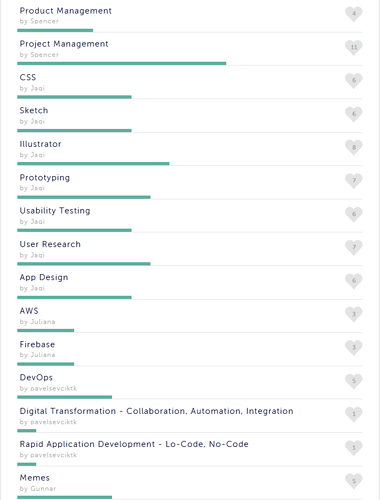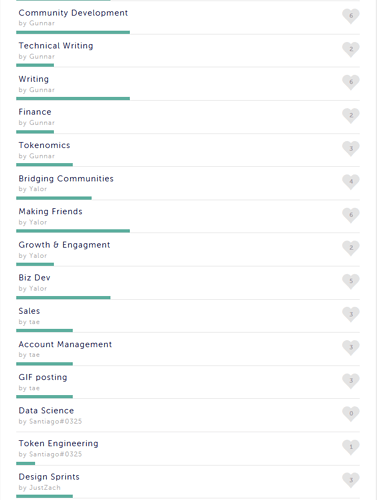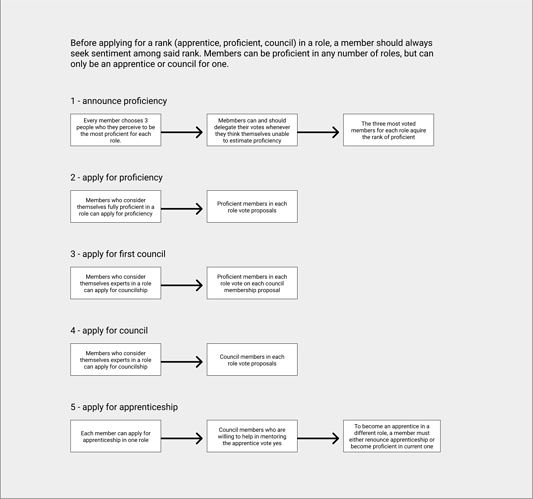After a few sessions of brainstorm, ideation, and identifying problems, we’ve been trying to settle on path for recognizing skills that is fair, reputable, viable, and useful. TL;DR at the end.
At the risk of oversimplifying: fair means that everyone is subject to the same rules for evaluation; reputable means a “skill badge” can’t be given away too easily; viable means we don’t try to certify every skill under the sun; and useful means the Guild should be able to extract value from the process.
Two of these points—reputable and useful—were highlighted in a recent discord poll:
https://discord.com/channels/684227450204323876/726514722110963773/824356242066898944
During a sprint exercise for the RIP,
@plor pointed out that trying to list/define the “important skills” under our role umbrellas is a moot point, especially for a v1 of a skill badge system. A previous poll and the boards of the exercise seem to support his point.
Board for Wizard skills:
https://www.figma.com/file/GyraEdhZO4u3YFw2leK0u2/Skill-Forest-RIP?node-id=87%3A6
Poll of general raiders' skills:
``https://poll.ly/#/G3laOO3q`
@DarrenM’s suggestion in the polls seems to be the most sensible answer: instead of trying to list or define skills, represent the overall knowledge in a field via ranks (eg. “junior”).
This structure has the added benefit that ranks such as “apprentice” can function better as a learning path than having X badges in a skill.
However, during other exercises the most frequent problem was bootstrapping credibility. If proficiency has to be recognized by peers, how do we get the first proficient members there? In this proposal, I say we take (a series of) votes.
Proposal for identifying and certifying proficiency as a collective:
https://www.figma.com/file/GyraEdhZO4u3YFw2leK0u2/Skill-Forest-RIP?node-id=61%3A79
1: Identify the "proficient vanguard"
One thing is clear: Raid Guild has a reputation. With the first votes, instead of saying “ACME certifying group attested that Alice is proficient in Solidity”, we’re saying “whatever reputation Raid Guild has in Solidity is represented by Alice”.
Each member chooses 3 other members as “the most proficient” for each role (eg: Wizard). These members should be chosen for best representing Raid Guild’s talent, and their proficiency in their field should be unquestionable.
Through delegation, members can give their voting power on a role to members they trust (abstaining is another option) for roles they are not knowledgeable in or when they don’t know the candidates’ proficiency and expertise.
2: Members of a rank approve others into rank
From this setup, we can follow a fairly straightforward system of petitioning for three ranks: apprentice, proficient, and council.
Apprenticeship
Apprenticeship is a way to signal a role you’re actively learning to get mentorship, aiding people with less experience achieve proficiency. A mentorship by approved council members can be better relied upon to guide new raiders, possibly distributing mentor responsibilities among more than one council member. It also creates accountability from the pupil. If you want to be an apprentice, you have to work/learn in order to maintain that status and receive mentoship.
Proficiency
After the initial proficiency identification, when someone applies for proficiency it is voted upon by all proficient raiders in that role. As with other proposals and petitions in the Guild, it is always recommended to gather sentiment, approval and feedback before submitting something to a vote.
This also separates the role of “guiding” someone to proficiency from the role of “certifying” it.
Council
The bootstrap for councilship will also first be done by peer vote. Proficient members will approve first council members. After we have the first council members for each role, they can be the ones deciding which members will join the council.
Unlike the initial proficiency bootstrap, members have to volunteer to be in the council.
Fairness, reputation, viability, and usefulness
I argue that this system meets all four initial goals. It is fair in the sense that members do not get a “higher rank” simply for being in the Guild for a longer time. And besides the initial vote for proficiency and councilship (which everyone votes on), from then on it will be a group of peers deciding on eligibility.
It also is as reputable as the DAO itself. It certifies the skill of raiders not according to Adobe or Apple’s standards, but to the Guild’s own standards, reputation, and values.
It is a much more viable path than trying to define “what skills are required to be a level 4 designer”. Even if many roles have to be voted upon, the responsibility of voting is fragmented across roles. By encouraging members to seek consensus, approval, and feedback before applying for a rank, we also attenuate burocracy in certification.
Lastly, I believe it is useful. By having one or more counselor in each role (first approved by their peers), RaidGuild will have clear points of reference in every field, by their own volition.
Expansibility
With use and in future iterations, we can begin to identify what exactly constitutes “proficiency” in each of our areas of expertise, fragmenting into levels and requirements as needed by each role. We can also help identify the best way to learn the ropes of a skill by observing our apprentices, developing learning paths and levels of apprenticeship to many skills.
Conclusion/TL;DR
The last image above (from the figma https://www.figma.com/file/GyraEdhZO4u3YFw2leK0u2/Skill-Forest-RIP?node-id=61%3A79) summarizes the proposed process. My main concerns were avoiding a scope too large, becoming unviable, or taking on responsibilies beyond the scope of this particular RIP (such as defining skillsets for every role).
I look forward to feedback on what could improve and criticism on what might not work (fork it). Thanks for reading, and please put your thoughts in the thread 


